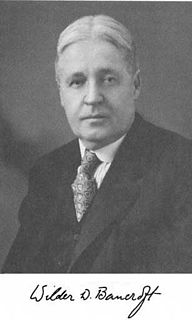A Quote by Henry David Thoreau
Since all things are good, men fail at last to distinguish which is the bane and which the antidote.
Related Quotes
Of the Logos which is as I describe it men always prove to be uncomprehending, both before they have heard it and when once they have heard it. For although all things happen according to this Logos, they [men] are like people of no experience, even when they experience such words and deeds as I explain, when I distinguish each thing according to its constitution and declare how it is; but the rest of men fail to notice what they do after they wake up just as they forget what they do when asleep.
The cause which is blocking all progress today is the subtle scepticism which whispers in a million ears that things are not good enough to be worth improving. If the world is good we are revolutionaries, if the world is evil we must be conservatives. These essays, futile as they are considered as serious literature, are yet ethically sincere, since they seek to remind men that things must be loved first and improved afterwards.
Men are not suffering from the lack of good literature, good art, good theatre, good music, but from that which has made it impossible for these to become manifest. In short, they are suffering from the silent shameful conspiracy (the more shameful since it is unacknowledged) which has bound them together as enemies of art and artists.
Do you not think that there are things which you cannot understand, and yet which are; that some people see things that others cannot? But there are things old and new which must not be contemplate by men´s eyes, because they know -or think they know- some things which other men have told them. Ah, it is the fault of our science that it wants to explain all; and if it explain not, then it says there is nothing to explain.
It is part of the moral tragedy with which we are dealing that words like 'democracy,' 'freedom,' 'rights,' 'justice,' which have so often inspired heroism and have led men to give their lives for things which make life worthwhile, can also become a trap, the means of destroying the very things men desire to uphold.
Since holiness is the main thing that excites, draws, and governs all gracious affections, it is no wonder that all such affections tend to holiness. That which men love, they desire to have and to be united to, and possessed of. That beauty which men delight in, they desire to be adorned with. Those acts which men delight in, they necessarily incline to do.
Happiness is a thing honored and perfect. This seems to be borne out by the fact that it is a first principle or starting-point, since all other things that all men do are done for its sake; and that which is the first principle and cause of things good we agree to be something honorable and divine.
We can distinguish three groups of scientific men. In the first and very small group we have the men who discover fundamental relations. Among these are van't Hoff, Arrhenius and Nernst. In the second group we have the men who do not make the great discovery but who see the importance and bearing of it, and who preach the gospel to the heathen. Ostwald stands absolutely at the head of this group. The last group contains the rest of us, the men who have to have things explained to us.
Anyone who is kind to man knows the fragmentariness of most men, and wants to arrange a society of power in which men fall naturally into a collective wholeness, since they cannot have an individual wholeness. In this collective wholeness they will be fulfilled. But if they make efforts at individual fulfilment, they must fail for they are by nature fragmentary.



































